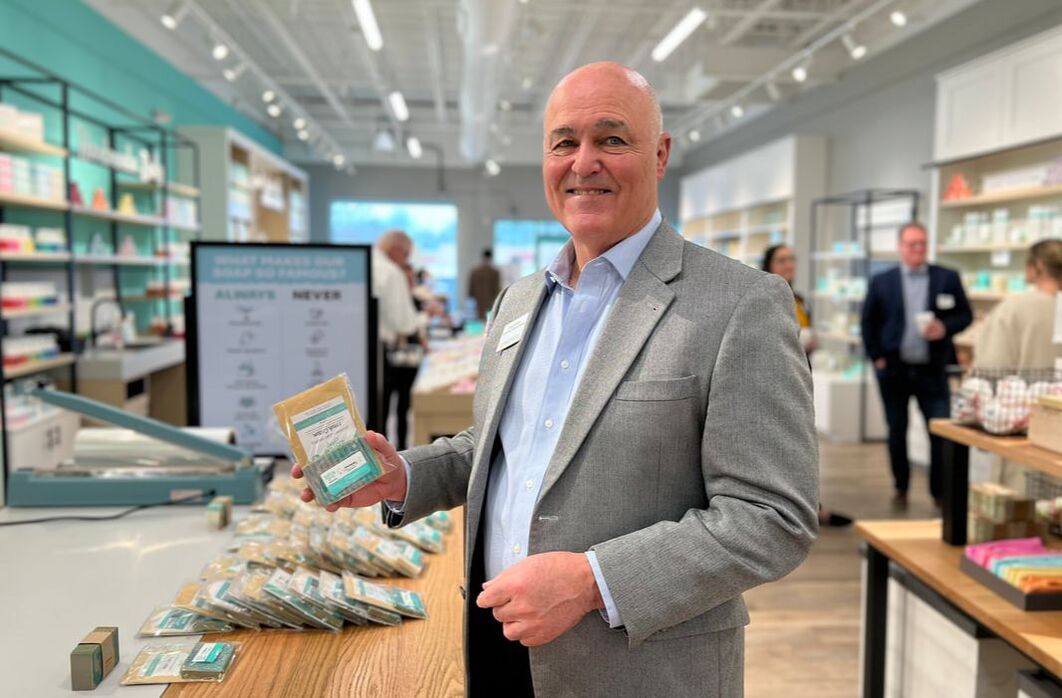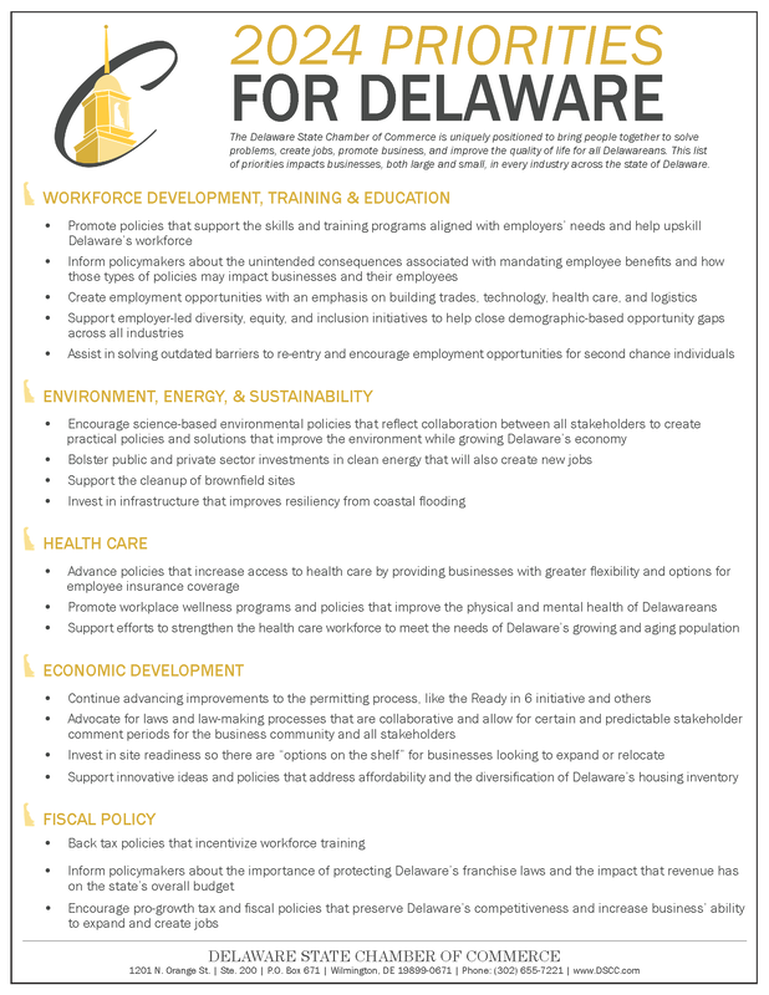 DSCC’S Fred Miller Retires Fred Miller graduated from West Chester State College in 1974 with a Health and Physical Education degree. He went on to teach physical education and serve as head wrestling coach at Coatesville High School until 1978, and kindergarten through fifth grade from 1979-1980. In 1981, Fred was hired by then Delaware State Chamber vice president, Blake Wilson, to sell memberships. After a brief period of time as vice president of sales and marketing at Suburban Marketing, Fred launched Miller Publishing where his first client was the Delaware State Chamber of Commerce. Along with selling advertising for the State Chamber’s publications, Miller proudly published four coffee table pictorial books—Chester County a Photographic Journey; Images of Delaware; Wilmington on the Move; and a book on the restoration of the Statue of Liberty called Liberty For All. He became full-time with the State Chamber in 2014. After nearly 40 years serving the Delaware State Chamber of Commerce, Fred looks forward to playing golf, traveling, and visiting with friends in his retirement. And, if you know Fred, he still plans on telling jokes—he may even grow a ponytail! Looking back at his time with the State Chamber, Fred reflects, “My years at the Chamber allowed me to work and learn from many talented people who took the time to share their knowledge with me. I hope over the years that I was able to pass some of that forward. I want to thank the Chamber and all my coworkers for putting up with my whistling, terrible singing, bad jokes, and crazy stories. I was truly blessed to be a part of this wonderful organization.”
0 Comments
 Today wrapped up the last day of session for the General Assembly before going on spring recess for two weeks. Below is a summary of the bills the State Chamber is following that saw movement, among others. HS 1 for HB 350 (Diamond State Hospital Cost Review Board): Establishes a “Diamond State Hospital Cost Review Board”. The new board, comprised of five volunteer political appointees, would review and either approve or reject all aspects of every Delaware hospital’s budget on an annual basis. The board would also hold meetings for the public to comment on and approve the budgets of Delaware hospitals. Position: The State Chamber is opposed to the bill and provided the following testimony during the committee hearing on March 27th: “This is a very challenging issue for an organization as diverse as the State Chamber. We acknowledge that healthcare is a top concern amongst our members. However, any proposal that addresses the concerns of payers should include “healthcare” defined broadly. Our members and their employees make regular use of doctor visits, drugs, pay insurance premiums, make hospital visits, use rehabilitation services, and so on. From the perspective of payers, the entirety of this is complicated and includes federal and state programs they have limited knowledge of. Small manufacturers, accounting firms, building contractors or retailers, healthcare is just not what they know or do. This is a benefit they provide their workforce but is not something they’re experts on. There are many pieces to this complicated puzzle, and while we understand the underlying premise behind the proposal before you today, we oppose HS 1 for HB 350.” Status: The bill was released from committee and now moves to House Appropriations. Five of the seven bills in Senator Huxtable’s housing package were heard in committee including:
Position: The State Chamber is engaged and gathering feedback on these bills. | Status: All five bills were released from committee and now move to the Senate Ready list except for SB 245 which has been assigned to the Senate Finance Committee. SB 23 and SB 247, the other two bills in the package of seven were not heard in committee this week and await consideration. SB 237 (County Comprehensive Plans): Amends the provisions in Title 9 of the Delaware Code relating to the county comprehensive plans for Sussex, Kent, and New Castle Counties, and Title 22 of the Delaware Code relating to municipal comprehensive plans for municipalities with populations greater than 2,000. The act would require that their comprehensive plans increase community resiliency and address the impacts of climate change. Position: The State Chamber is engaged and looking for feedback. Status: Released from committee and placed on the Senate Ready list. The State Chamber has also received a draft copy of a credit card surcharge bill. You can view the draft here. Representative Baumbach has requested the State Chamber’s feedback on the bill. Please review the bill and let me know if you have any thoughts. Some other bills that didn’t see movement which the State Chamber is following and engaged on include:
If you have any feedback on any of the items, please let me know. The General Assembly will return to session on Tuesday, April 16th.  Today wrapped up another week of session for the General Assembly, who only has one week left before spring recess begins. They will return to session on Tuesday, April 16th, following the recess. There have been developments in the status of several bills in which the Delaware State Chamber is following: HB17 (Paid Sick and Safety Leave): This bill requires all employers in the State to provide employees with a minimum of one hour of earned sick time and safety leave for every 30 hours worked. For employers with nine or fewer employees, the time may be unpaid, job-protected time instead of paid time.
HS1 for HB350 (Diamond State Hospital Cost Review Board): Establishes a “Diamond State Hospital Cost Review Board”. The new board, comprised of five volunteer political appointees, would review and either approve or reject all aspects of every Delaware hospital’s budget on an annual basis. The board would also hold meetings for the public to comment and approve the budgets of Delaware hospitals.
The substitute differs from the original bill in that:
If you have feedback on these bills or others, please let me know.  Today wraps up a busy week for the General Assembly! Several bills were acted on or introduced which will impact the business community. Below is a summary of those bills. Bills introduced:
Bills acted upon:
Please let us know if you have any comments or questions regarding any of these items. The State Chamber will continue to follow these bills along with others. One bill of note which is scheduled to be heard in Committee next week is HB17 (paid sick and safety leave). The bill requires all employers in the State to provide employees with a minimum of 1 hour of earned sick time and safety leave for every 30 hours worked. The State Chamber is opposed to the bill and will be testifying at the hearing on Tuesday, March 19 at 12:45pm (Note: the timing of this meeting has changed as of 3/15). You can view the meeting notice and sign up to listen or comment here. If you’re a business owner, please consider signing up to testify how this policy will impact you.  The General Assembly returned to session this week from the Joint Finance Committee break. The week kicked off with Governor Carney delivering the State of the State Address on Tuesday. Some topics he touched on included strengthening the economy, protecting the environment, and responsibly managing the state budget. You can learn more and watch the full address here. In addition, several bills were introduced recently that the State Chamber is engaged with. Those bills included:
The State Chamber is looking for feedback from our members on these bills. Please let me know if you have any questions or feedback regarding any of these items. One bill of note that saw movement this week was SS1 for SB147 (Computer-Related Crimes). The bill creates an exception to the computer crimes under §§ 932, 933, and 935 of Title 11. The bill passed in the Senate and now moves to the House for consideration. The State Chamber is going to be seeking amendments for this bill.  By Tyler Micik Today wraps up the last day of session for the General Assembly before Joint Finance Committee (JFC) hearings begin next week. The General Assembly will return to session on Tuesday, March 5, which is the date of the Governor’s State of the State address. The Governor delivered his FY25 recommended budget address today in Dover. You can view a copy of the presentation here. The Joint Finance Committee will hold hearings throughout February to discuss the Governor’s recommended operating budget. The proposed $6 billion operating budget includes $66 million in grants-in-aid, $943 million for bond and capital improvements, and $91 million for the one-time supplemental budget. The Governor’s recommended budget also includes $52 million towards economic development. This investment supports the site readiness fund and Ready in 6-like programs, among others – which is a top priority of the State Chamber. Since 2017, investments in economic development have helped add 32,100 jobs to Delaware's economy – which is the best job growth the state has seen in the past twenty years. Lastly, one particular area the Governor emphasized is Delaware's rising health care costs. The budget calls for nearly $2 billion dollars to be spent on Medicaid and insurance plans for state employees and retirees. Which is a $200 million dollar increase from FY24 and accounts for nearly 40% of operating budget growth. Unless this is addressed health care costs will continue to crowd out investments in other areas like economic development, affordable housing, and childcare among others. By Tyler Micik
In came the snow and out went the General Assembly! This week was a relatively quiet week in Dover. Session was cancelled on Tuesday due to the weather and the General Assembly planned on holding a joint session today due to the Governor’s State of the State Address, which was postponed this morning. A new date will be announced soon. Although this week was short, things are sure to pick up soon. There are several bills, which the State Chamber is following, that were introduced last year and are awaiting consideration by the General Assembly. Some of those bills include HB248, HB249, and HB246. A great way to stay up to date on the bills we’re engaged on, which may impact your business and employees is to join one of our policy committees. You can learn more about them here. Our committees give us critical feedback and help guide our positions on policy issues. To learn more or participate, please contact me at [email protected].  By Tyler Micik The 152nd Delaware General Assembly gaveled into the second and final leg of session this week. As a reminder, any bills that were introduced last year and were not defeated or enacted remain active and carry over to this year. Overall, it was a pretty light week as far as acted-upon legislation goes – only a small number of bills (none of which the State Chamber is following or engaged on) were heard in committee and placed on the full agenda for a vote in both Chambers. Additionally, the Senate did not gavel into session on Wednesday. Much like the first week of school, this week is a time for legislators, lobbyists, and others to catch up after the long break and welcome new faces. One of those new faces is Representative Valerie Jones Giltner who was sworn into office on Tuesday. Rep. Giltner replaces Rep. Briggs King, who resigned in November, and will represent Delaware’s 37th House District. The State Chamber looks forward to working with her and all the members of the General Assembly this year in support of our 2024 policy priorities. One issue the State Chamber has its eyes on and will be a topic of conversation in the coming weeks is HB249, known as the DNREC Permit and Fee Increase Bill. The current version was introduced on June 28th and has been assigned to the House Natural Resources and Energy Committee. We expect a substitute bill to be introduced, although it’s unclear what it will look like. As currently written, HB249 proposes 155 permit/fee changes. DNREC is proposing these changes because 92% of the fees have not been adjusted since 1991. The proposed adjustments aim to contribute to funding investments in technology, salaries, and other aspects for the Department. You can view the bill here and a copy of the fee proposal chart here. Please look at both and let me know if you have any thoughts/feedback. We want to hear from you! And if you’re interested in staying up to date on environmental policy, consider joining our Environmental Committee.  By Tyler Micik It's a new year and as the sound of holiday bells subsides, the ringing of bells within Legislative Hall begin again, signaling the start of the second leg of the 152nd Delaware General Assembly. The State Chamber looks forward to working with members of the Delaware General Assembly to achieve our 2024 policy priorities. Our policy priorities are a coordinated list of feedback from our members that includes items we’ve identified as critical because they impact not just our members but the business community at large—regardless of size and industry. Please keep in mind this list is not exhaustive, and it’s designed to be a living document that’s ever-changing to meet the needs of the business community. I’d like to take this opportunity to highlight a couple of topics mentioned in this list. FRANCHISE LAWS Unlike the old saying “Don’t shoot the golden goose,” some members of the General Assembly are proposing legislation that would shoot Delaware’s “golden goose.” Incorporation fees and unclaimed property revenues make up almost half of Delaware’s net general fund revenues. Delaware is internationally recognized as an incorporation destination due to its business-friendly tax laws and Court of Chancery. Corporations registered in Delaware don’t pay corporate income tax and corporate lawsuits are settled by the Court of Chancery—a non-jury trial court with a long history dating back to 1792, comprised of judges specializing in corporate law. For these reasons, companies choose to call Delaware their corporate home despite intriguing offers to go elsewhere, and other states’ efforts to try and duplicate Delaware’s laws. The introduction or passage of any policy directed at undermining these laws will cause corporations to leave, other states to reap the rewards, and Delawareans will be asked to make up for lost revenues through other means like a sales tax, which Delaware—along with only four other states—does not have. PERMITTING Delaware has made significant improvements to its permitting processes, and we thank the Governor and the General Assembly for doing so, but more work must be done. Many businesses are good stewards of the environment and the communities they serve. The perception by some to the contrary, in most cases, is inaccurate and benefits no one. We hope that policymakers will support laws and law-making processes that are collaborative and allow for certain and predictable comment periods for the business community and all stakeholders so that real progress can be achieved. We can’t accomplish anything, especially the State’s clean energy goals, if project timelines are unclear and the obligations placed on businesses are overburdensome. The decisions made this year by those in the General Assembly and by Delaware voters in the fall will have lasting impacts on Delawareans and Delaware’s reputation as a business-friendly state. As the state’s largest business advocacy organization, the Delaware State Chamber of Commerce is uniquely positioned to bring parties together to solve problems, create jobs, promote business, and improve the quality of life for all Delawareans. In that spirit, we look forward to continuing to advocate for our members in 2024.  By Regina Donato “The Delaware State Chamber of Commerce's passion and commitment to the Delaware business community excites me,” says Nadir Rasheed of Waste Management. “I really enjoy the way the State Chamber not only engages their opportunities, problems and concerns, but also presents the community with several solutions to make Delaware an even more beautiful place.” The Delaware State Chamber of Commerce is the unified voice for business. We are uniquely positioned to bring people together to solve problems, create jobs, promote business, and improve the quality of life for all Delawareans. Our two pillars are:
 To further drive our mission and diversify our network, we are seeking individuals to serve in our reinvented ambassador program. Ideal candidates are energized by the State Chamber’s mission and committed to helping improve the state of Delaware. We are looking for people who are passionate and willing to foster new relationships for the Chamber within their individual networks. As the Delaware State Chamber of Commerce, it is our goal to reach and represent everyone in the Delaware business community state-wide. As a key volunteer for the State Chamber team, Ambassadors will serve as outward-facing representatives of the organization with three key goals:
We welcome the following Ambassadors:
If you're interested in becoming a State Chamber Ambassador, we want you! Please fill out this form. Candidates must work for a member organization to be considered for the Ambassador Committee. The group will meet bi-monthly, with our first meeting on July 26th at 12:00 PM. To learn more about the role, responsibilities, and benefits, feel free to read the full job description or contact me at [email protected]. |
Archives
July 2024
Categories
All
|
|
Copyright Delaware State Chamber of Commerce, Inc.
All Rights Reserved. PO Box 671 | Wilmington DE 19899 (302) 655-7221 | [email protected] | sitemap |
|




 RSS Feed
RSS Feed